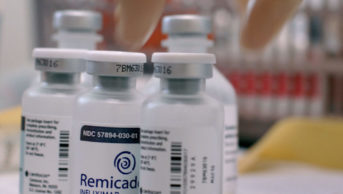
Shutterstock.com
Patients with rheumatoid arthritis (RA) may need fewer monitoring blood tests, following the development of a new method for predicting the risk of side effects in people taking methotrexate, results from a study funded by the National Institute for Health and Care Research (NIHR) have revealed.
The method uses risk-stratified monitoring for toxicity linked to methotrexate — an immune-suppressing drug, which is the most common treatment for arthritis — giving a score to predict each patient’s risk of abnormal blood test results.
The study, published in the British Medical Journal on 30 May 2023, looked at adults who have been prescribed methotrexate for six months or more between 2007 and 2019, to analyse the need for monitoring blood tests during long-term use of the treatment.
It looked at anonymised data from 37,109 adults undergoing treatment for inflammatory conditions, using electronic health records and routine consultations, to produce the risk-stratification system.
Low doses of the drug, administered on a weekly basis, are used by people with RA, psoriatic arthritis and cutaneous psoriasis resistant to topical treatment or phototherapy. Patients with inflammatory bowel disease also benefit from methotrexate.
The new risk-stratification approach was led by researchers at the University of Nottingham. Study author Abhishek Abhishek, professor of rheumatology at the university, said the findings would help improve the care of patients.
“The method uses information available during routine consultations, at no extra cost, and provides individual risk scores that may be used alongside patient preference to decide the interval between monitoring blood test appointments,” he said.
“Many patients with inflammatory conditions take methotrexate for several years — often for more than ten years — and the results of this study will be useful in reducing unnecessary monitoring blood tests for them over a long period of time.
“Implementing these results could vastly improve the utilisation of NHS resources, save patients time and also protect the planet by reducing the carbon footprint of monitoring tests.”
According to the NIHR, around 1.3 million people in the UK take methotrexate for inflammatory conditions and are offered blood tests every two to four weeks when they start taking the drug, which is followed by three-monthly tests for the duration of their time using the drug.
Commenting on the study, Wendy Holden, medical adviser for the charity Arthritis Action and honorary consultant rheumatologist, said: “It’s reassuring to know that, in this community-based study, most abnormalities in routine methotrexate blood test monitoring are picked up in the first year and that those at risk might now be able to be readily identified in advance.
“More work still needs to be done, but hopefully this work could allow less frequent blood tests especially after the first year, saving time, money and unnecessary worry for patients.”


